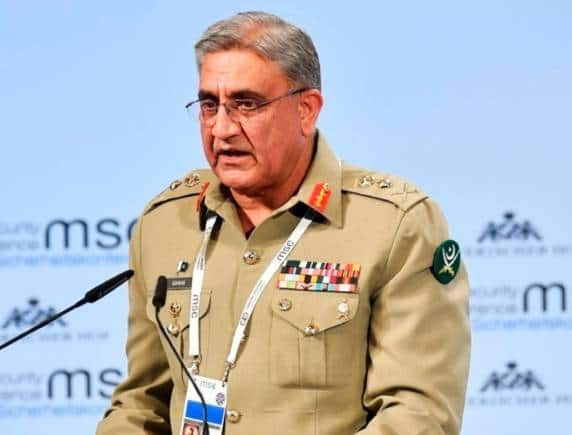Pakistan Prime Minister Imran Khan is said to have met his wife Bushra sometime in 2015, just before his party, the Pakistan Tehreek-e-Insaf, made its first electoral breakthrough.
Gazing out at the stars from her palace on the banks of the Tigris, Bawran bint al-Hasan’s astrolabe led her to a qat, a gash in the course of destiny: The life of her brother-in-law, caliph of the Abbasid empire from 833 CE to 842 CE, was under threat from an object made of wood. “At the appointed time,” historian George Saliba records, “every precaution was taken.” “When his servant brought him his comb and toothpicks, al-Hasan ordered the servant to use them before the caliph. As soon as he did, his head swelled and he fell dead.”
Fortune, as the stars had foretold, did turn: queen Bawran, long out of favour at court, was restored her lost palaces and estates, and her father taken back into the service of the caliph.
As Pakistan's Prime Minister Imran Khan battles the Pakistan army—refusing to sign-on to the appointment of a new Director-General to the powerful Inter-Services Intelligence Directorate (ISI), more than 15 days after the military made the announcement—suspicion is growing that the occult might be illuminating his path.
Last week, Palwasha Khan, a politician of the opposition People’s Party of Pakistan, let it be known that a mysterious, black-robed coven had been inserting needles into voodoo dolls representing the prime minister’s enemies, in the woods behind his home in Islamabad’s Bani Gala. Imran’s own black-robed wife—a mystic reputed to leave bowls of meat for a djinn she controls—is claimed to be key to his insistence that Lieutenant-General Faiz Hameed remain as ISI chief, stemming from the prophecy that their fortunes are inextricably entwined.
In general, prime ministers who pushed back against the military’s choice of ISI chief haven’t done well: Benazir Bhutto lasted just 15 months after picking retired Lieutenant-General Shamsur Rahman Kallue for the job, and Nawaz Sharif’s selection, Lieutenant-General Khawaja Ziauddin Butt, ended up incarcerated after the 1999 military coup.
Read more: Pak ISI chief goes in military reshuffle, sends ripples down the political system
This time, though, Imran seems to believe a higher power is guiding the high-risk path. There’s more method in this madness, though, than one might at first glance imagine.
Little doubt exists that the story has something to do with Imran’s third wife, Bushra Khan, whom the world has only seen—literally and metaphorically—from behind the veil. Born in 1974 in Depalpur—well-known to Indians as 26/11 perpetrator Muhammad Ajmal Kasab’s home town—Bushra was born into a minor branch of the prominent landowning jatt-caste Wattoo clan. At just 15, she was married to Khawar Maneka, the son of a former provincial minister, and a customs official.
The marriage was, according to a member of her extended family, a source of some unhappiness within the clan, with Khawar’s mother resisting what she saw as a social step down for her son.
Little is known about how Bushra grew herself into a Pirni, or religious leader. In several media accounts, she has been associated with the famous shrine of Fariduddin Ganjshakar, a 13th-century Sufi mystic. Khawar’s family has ancestral ties to the Ganjshakar shrine, but there’s no public record of her occupying a role in its affairs, or hosting religious events.
Instead, Bushra appears to have embedded herself in circles of local women with an interest in the occult. The group included Farah Jabeen, at whose home Bushra and Imran are
reported to have secretly married in early 2018. These religious circles have, by the accounts of many political insiders, come to occupy not a little importance as brokers of access to the prime minister.
Faiz Hameed and his wife, Islamabad gossip holds, were among those who associated themselves with this group, hoping to secure the ISI chief’s promotion to office after General Qamar Javed Bajwa leaves it on November 28, 2022. At that time, General Faiz will be fourth in seniority in the Pakistan Army.
General Bajwa’s support for Faiz—once seen as his likely successor—strained as a result of his brazen support for Imran’s political interests, the story goes. It is also possible that Western pressure had something to do with the decision, as Faiz was closely linked to Pakistan’s failure to rein-in the Taliban.
The mystery over who introduced Imran to Bushra, crucially, remains unresolved. He is said to have begun visiting her around 2015, in the build-up to the election of billionaire businessman-politician Jahangir Khan Tareen, the first electoral breakthrough made by Imran’s Pakistan Tehreek-e-Insaf party. The godwoman, the story goes, impressed him with the quality of her predictions on that election.
Exactly how one thing led to the next—the next, in this case, being two divorces, and marriage to a woman Imran claims not have seen unveiled before his wedding—remains shrouded in mystery.
In some tellings of the story, Bushra promised that the stars foretold their marriage would lead to his becoming prime minister. In other accounts, Bushra was fed political intelligence by the ISI, which she passed on to a credulous Imran dressed up as prophecy. In the absence of a credible biographical account, these stories—put out by Imran’s opponents—must of course be treated with great caution.
That Imran’s personality includes a wellspring of gullibility, though, has some basis. The prime minister’s former wife, Rehman Khan—amidst a catalogue of more usual cricket-star practices, like threesomes, cocaine-snorting, and anal dildos—has famously written that he rubbed black lentils into his genitals, to ward off evil spells.
Imran himself has said little on this subject. In a rare interview on his personal life, the prime minister claimed his relationship with Bushra was driven by a decades-old interest in Sufism—the existence of which seems to have been a carefully-kept secret. Even though “I know more about physical attraction than anyone else,” Imran insisted, “actually the character of a person and the mind, the intellect, is much more important than the physical... Sufism is an order with many levels, but I have never met anyone who is as high as my wife.”
Little reason exists, though, to be surprised if superstition did guide the decision: many Indian politicians, and even some in the West, seek comfort in the advice of soothsayers and astrologers. In Imran’s case, though, the stars are also guided by cold logic.
The prospect that the Bushra-Imran relationship was prodded along by the ISI, though, isn’t beyond the realm of possibility. From 2015, the ISI, under Lieutenant-General Rizwan Akhtar, had committed itself to dismantling prime minister Nawaz Sharif’s efforts to seek rapprochement with India. The army had a simple aim: to rid itself of a powerful politician who was seeking to end its hegemonic grip over national security and strategic policy. Faith was a critical tool.
Imran’s efforts to cast himself at the vanguard of Islam are evident everywhere. Islam is being more deeply embedded in school curricula; Imran has thrown himself on the frontlines of battles against purportedly-blasphemous speech and moral corruption, and set up a new clerical council to guide the course of national policy.
To commemorate the month of the Prophet Muhammad’s birth, the Punjab Government has ordered that “no music/movie or obscenity be tuned in all forms of transport vehicles during these days except recitation of Holy Quran [sic].”
Even Imran’s insistence that he pick the Director-General of the ISI, and other top military officials, has been dressed up in religious robes. In one speech, he pointed to the sacking of a military commander Khalid ibn al-Walid by the caliph Umar ibn al-Khattab. Although modern historians have a somewhat more nuanced telling of the story than Imran, the message was clear: the prime minister, not the generals, had the legitimacy vested by Islamic tradition.
The story, in some senses, dates back to 9/11. Following his decision to back the United States in its war on terror, scholar Iqbal Sevea has noted, the state threw its weight behind the Barelvi order, traditionally associated with syncretic folk Islam. In 2016, General Pervez Musharraf’s regime established a national council to promote Sufism; a Barelvi cleric was appointed the federal minister for religious affairs and six more to the Council of Islamic Ideology, responsible for making law consonant with faith.
General Muhammad Zia-ul-Haq, and his predecessors prime minister Zulfikar Ali Bhutto and General Ayub Khan, had each sought to harness Islam to the cause of the state, using groups of political Islamists and the Deoband movement’s clerics; now a new variant was being used.
In practice, the so-called moderates the military incubated proved no less reactionary than the Islamists. The Barelvi clerics were soon spearheading violent movements against so-called blasphemy, invoking the legacy of communally-charged battles of a century earlier, which powered the Pakistan movement. The Barelvi blasphemy mobilisations led on to the assassination of Punjab Governor Salman Taseer in 2011.
The military, however, found these new allies useful, for the same reasons as its predecessors. In 2012 and 2014, the Canada-based Barelvi leader Tahir-ul-Qadri led military-supported movements which battered two successive democratic governments into submission. In 2017, the then-Director General of the Punjab Rangers, Major-General Azhar Hayat, was filmed handing out cash to clerics of the ultra-Right Tehreek Labbaik Pakistan (TLP), who were protesting against prime minister Sharif’s government.
Even though Bushra has no real heft within these Barelvi clerical networks, Imran’s decision to marry her likely signalled his willingness to act as a political representatives of these forces. Even as Imran battled army chief General Qamar Javed Bajwa over the ISI appointment, notably, his government released the head of the TLP, Saad Hussain Rizvi, from prison.
Imran has also reached out to other Islamist groups—vocally supporting the Taliban, seeking to make peace deals with their affiliates within Pakistan, and allowing the leadership of the Lal Masjid, which engaged in armed insurrection against the state in 2007, to mobilise freely.
Is this the moment when the religious right and the military head towards crisis?
 File image: Pakistan's Army chief General Qamar Javed Bajwa
File image: Pakistan's Army chief General Qamar Javed Bajwa
For now, General Bajwa hasn’t shown his hand. There are, however, three options ahead for Pakistan’s military. First, it could stage a coup—though the Generals have good reasons to avoid taking charge of the country, faced with a disintegrating economy and spiralling conflict in its Afghan border regions. The second is to ease out Imran through a confidence vote in Parliament, and then head towards fresh elections. The third, though, is to do nothing, and work towards some form of compromise between the army chief and the prime minister. This could suggest General Bajwa is concerned with pushback from within the military’s own ranks.
Lieutenant-General Naveed Anjum, General Bajwa’s ISI chief designate, and believed by Indian intelligence analysts to have no significant political affiliations, is reported to have met Imran earlier this week, in what is being read as a last-ditch effort at conciliation. There’s no sign so far, though, that Imran is willing to sign on to his appointment.
Either way, the Imran-Army relationship has likely frayed beyond repair. This fateful power struggle is just beginning.



































